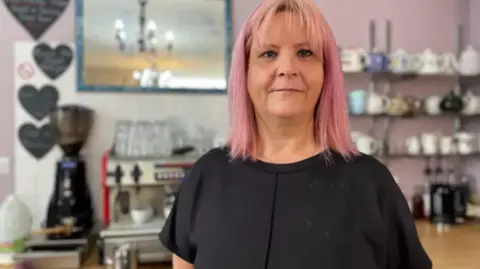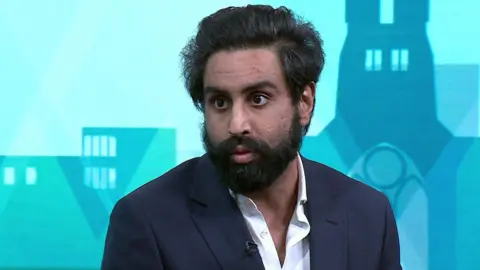Cafe owner's fears over cut to business rate relief
 BBC
BBCA small business owner has said her cafe will struggle to survive due to rising costs and is calling on the government for more support.
Donna Carr runs Dot-teas Emporium, which also acts as a hub for people to come together for art and craft projects, in Bridge Street in Belper, Derbyshire.
She said the 2024-25 financial year had been the worst since she opened in 2019.
Ms Carr thinks the situation for her and others will "only get worse" due to the expected reduction in business rate discounts and the cost-of-living crisis, adding: "I don't think [the government] do anything to support us."
In the new financial year, National Insurance contributions (NICs) for employers are set to rise from 13.8% to 15%, there will be a reduction in business rate discount and an increase in the minimum wage.
The level at which employers start paying NICs, the secondary threshold, will also reduce from £9,100 to £5,000 per year.
But the Employment Allowance, which helps eligible employers reduce their NIC liability, will increase from £5,000 to £10,500 to enable small businesses to offset the rise.
Since 2020, businesses like cafes, bars and retail units have had a 75% discount on business rates - capped at £110,000 per business - but this is due to expire on Tuesday.
'Downward spiral'
Ms Carr described the 2024-25 financial year as "shocking".
She described her current situation as "hand to mouth" and fears there will be a "downward spiral".
"I don't think [the government] think about the independent businesses," she added.
"They all say 'shop local' but it's us that gets hammered.
"We're not the big companies, they can afford it but we can't.
"I don't think they do anything to support us."

Speaking on Politics East Midlands, Jeevun Sandher, Labour MP for Loughborough, said the largest burden on NICs would be on large employers.
"Our changes on National Insurance double the employer allowance so you can now employ four people on the National Minimum Wage without paying National Insurance," he said.
"It does mean a million businesses will pay the same or less than before... it's essentially a tax cut in April.
"Our decisions around tax were to protect the smallest businesses... in order to fund investment in the NHS.
"We've protected the smallest employers by putting [the changes] on the largest employers as well as the richest individuals."
Follow BBC Derby on Facebook, on X, or on Instagram. Send your story ideas to [email protected] or via WhatsApp on 0808 100 2210.
